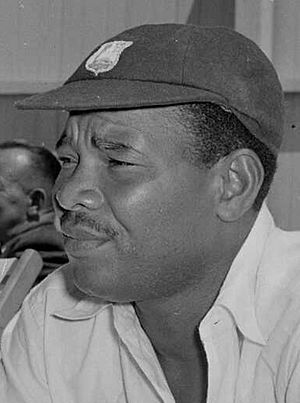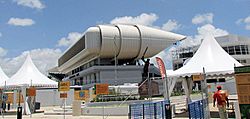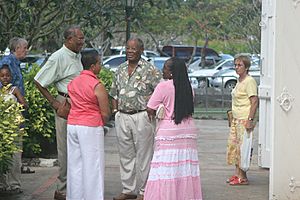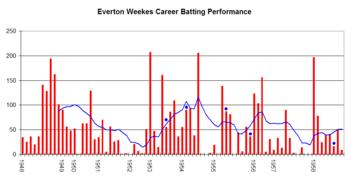Everton Weekes facts for kids

Weekes in 1956
|
||||||||||||||||||||||||||||||||||||||||
| Personal information | ||||||||||||||||||||||||||||||||||||||||
|---|---|---|---|---|---|---|---|---|---|---|---|---|---|---|---|---|---|---|---|---|---|---|---|---|---|---|---|---|---|---|---|---|---|---|---|---|---|---|---|---|
| Full name |
Everton DeCourcy Weekes
|
|||||||||||||||||||||||||||||||||||||||
| Born | 26 February 1925 Saint Michael, Barbados |
|||||||||||||||||||||||||||||||||||||||
| Died | 1 July 2020 (aged 95) Christ Church, Barbados |
|||||||||||||||||||||||||||||||||||||||
| Batting | Right-handed | |||||||||||||||||||||||||||||||||||||||
| Bowling | Right-arm leg break | |||||||||||||||||||||||||||||||||||||||
| Role | Occasional wicket-keeper | |||||||||||||||||||||||||||||||||||||||
| Relations | David Murray (son) Ken Weekes (cousin) Ricky Hoyte (grandson) |
|||||||||||||||||||||||||||||||||||||||
| International information | ||||||||||||||||||||||||||||||||||||||||
| National side | ||||||||||||||||||||||||||||||||||||||||
| Test debut (cap 59) | 21 January 1948 v England | |||||||||||||||||||||||||||||||||||||||
| Last Test | 31 March 1958 v Pakistan | |||||||||||||||||||||||||||||||||||||||
| Domestic team information | ||||||||||||||||||||||||||||||||||||||||
| Years | Team | |||||||||||||||||||||||||||||||||||||||
| 1944–1964 | Barbados | |||||||||||||||||||||||||||||||||||||||
| Career statistics | ||||||||||||||||||||||||||||||||||||||||
|
||||||||||||||||||||||||||||||||||||||||
|
Source: ESPN Cricinfo, 1 July 2020
|
||||||||||||||||||||||||||||||||||||||||
Sir Everton DeCourcy Weekes (born February 26, 1925 – died July 1, 2020) was a famous cricketer from Barbados. He was a right-handed batsman known for hitting the ball very hard. Weekes holds a special record for scoring five centuries (100 runs) in a row in Test cricket matches.
He was part of a famous trio called "The Three Ws" of the West Indies cricket team, along with Frank Worrell and Clyde Walcott. Weekes played in 48 Test matches for the West Indies from 1948 to 1958. He also played first-class cricket until 1964, scoring over 12,000 runs. After retiring from playing, he coached the Canadian team at the 1979 Cricket World Cup. He also worked as a cricket commentator and an international match referee.
Contents
Growing Up and Starting Cricket
Everton Weekes was born in a small wooden house in Westbury, Barbados, close to the Kensington Oval cricket ground. His father named him after the English football team Everton.
His family was not wealthy. When Weekes was eight, his father left Barbados to work in the oil fields of Trinidad and Tobago and did not return for eleven years. Weekes and his sister were raised by their mother, Lenore, and an aunt. Weekes went to St Leonard's Boys' School. He loved sports, especially cricket and football. He even played for the Barbados football team.
As a boy, Weekes helped the groundskeepers at Kensington Oval. Sometimes, he would fill in as a fielder during matches to get free entry. This allowed him to watch top international cricketers up close. At 13, he started playing for Westshire Cricket Club. He wanted to play for his local club, Pickwick, but it was only for white players at the time.
In 1939, at age 14, Weekes left school. He spent his days playing cricket and football, which he said helped him become a better cricketer. In 1943, Weekes joined the Barbados Regiment and served until 1947. Being in the military allowed him to play for Garrison Sports Club, a higher-level team, in addition to Westshire.
Early Professional Cricket Career
Weekes's strong performances in local cricket led to him being chosen for a trial match in 1945. This match was to pick a team to represent Barbados on a tour of Trinidad and Tobago. Weekes scored 88 runs and then 117 runs (retired, meaning he stopped batting without being out). He was then selected for the tour.
He made his first-class debut on February 24, 1945, just before his 20th birthday. He played for Barbados against Trinidad and Tobago. In his first two seasons, Weekes had moderate success. But in 1946/47, he started to play much better. He scored his first first-class century, 126 runs, against British Guiana. He averaged 67.57 runs for that season. In 1947/48, he scored an unbeaten 118 runs against the touring MCC team, impressing the West Indies selectors.
The Famous Three Ws
Weekes was one of the "Three Ws," along with Clyde Walcott and Frank Worrell. They were all amazing batsmen from Barbados. All three made their Test debuts in 1948 against England. They were born within 17 months of each other and lived less than a mile from Kensington Oval. Walcott even believed the same midwife delivered all of them.
Weekes first met Walcott in 1941 when they were 16 and played on the same team in a trial match. They often shared rooms on tour. Along with Worrell, they would go dancing after cricket matches on Saturday nights.
An English journalist first used the name "Three Ws" during the West Indies' tour of England in 1950. Walcott thought Weekes was the best all-around batsman of the three. Worrell was the best all-rounder, and Walcott modestly said he was the best wicket-keeper. After they retired from cricket, they remained close friends. When Worrell passed away in 1967, Weekes was one of the people who carried his coffin at the funeral.
The 3Ws Oval, a cricket ground at the University of the West Indies, is named in their honor. There is also a monument to them across from the oval. Worrell and Walcott are buried on a hill overlooking the oval.
Test Cricket Career
| Don Bradman (AUS) |
99.94
|
| Adam Voges (AUS) |
61.87
|
| Graeme Pollock (RSA) |
60.97
|
| George Headley (WI) |
60.83
|
| Herbert Sutcliffe (ENG) |
60.73
|
| Eddie Paynter (ENG) |
59.23
|
| Ken Barrington (ENG) |
58.67
|
| Everton Weekes (WI) |
58.61
|
| Wally Hammond (ENG) |
58.45
|
| Garfield Sobers (WI) |
57.78
|
|
Source: Cricinfo Qualification: 20 completed innings, career completed. |
|
Weekes played his first Test match for the West Indies against England on January 21, 1948. He was 22 years old. He scored 35 and 25 runs in that match, which ended in a draw.
His first two Test matches did not show how amazing he would become. He was even dropped from the team for the fourth match against England. But an injury to another player, George Headley, allowed Weekes to return. He then scored 141 runs, his first Test century. This led to him being chosen for the West Indies tour of India, Pakistan, and Ceylon.
In his next Test match against India in November 1948, Weekes scored 128 runs. He followed this with 194 runs in the second Test, and 162 and 101 runs in the third Test. He then scored 90 runs in the fourth Test and 56 and 48 runs in the fifth Test.
Weekes's five Test centuries in a row is a world record! He also set a record by scoring seven half-centuries (50 runs or more) in a row. By the end of that series, Weekes had a Test batting average of 82.46. He reached 1,000 Test runs in just his twelfth innings, which was faster than almost anyone else. For his great performance, Weekes was named one of the 1949 "Cricketers of the Year" in India.
Touring England in 1950
In 1950, the West Indies team toured England. Weekes continued his excellent form, scoring 338 runs in the Test series. He played a big part in the West Indies winning the series 3–1. He also scored 2310 runs in first-class matches during the tour, including five double centuries (200 runs or more). This was a record for a West Indian tour of England. By the end of the series, Weekes had scored 1,410 Test runs. He also became known as one of the best fielders in cricket, catching 11 balls in the series. His score of 304 not out against the University of Cambridge is still the only triple century by a West Indian on tour in England. Because of his amazing performance, Weekes was named a 1951 Wisden Cricketer of the Year.
Tours of Australia and New Zealand 1951/52
Weekes faced many injuries during the West Indies tour of Australia in 1951/52. He had a thigh injury and a badly bruised thumb. Australian fast bowlers, especially Ray Lindwall, targeted Weekes with fast, short balls aimed at his body. This tactic was similar to "Bodyline" bowling. Many believed these tactics were unfair. After the Australian tour, the West Indies visited New Zealand. In one match, Weekes even filled in as a wicket-keeper and made his only stumping in first-class cricket.
Records and Achievements
In February 1953, Weekes broke George Headley's record for the most Test runs scored by a West Indian player. Weekes held this record until 1966. In a match against Australia in 1954, Weekes took his only Test wicket. He also scored three centuries in a row against New Zealand in 1956. In 1954, Weekes became the first black captain of Barbados to hold the position permanently.
During the 1957 tour of England, Weekes was unwell with a sinus infection and broke a finger. Despite this, he played a brilliant innings of 90 runs in a Test match at Lord's. This innings was called "the innings of a genius" by fellow cricketer Denis Compton. During this tour, Weekes became the first West Indian to score over 3,000 Test runs and later, 4,000 Test runs.
Playing in the Lancashire League
In 1949, Weekes agreed to play as a professional for Bacup in the Lancashire League in England. Being a "professional" meant he was paid to play for the club. When he first arrived, he found the cold weather difficult. He often wore a large army coat, which became part of his image. He missed Barbados, but his landlady's food and the company of Worrell and Walcott (who were playing for other League clubs) helped. The "Three Ws" often met up to play piano and sing jazz.
Weekes played seven seasons in the Lancashire League between 1949 and 1958. He scored over 1,000 runs in each season. His 1,518 runs in 1951 is still a club record. He scored a total of 9,069 runs for Bacup, with 25 centuries. His score of 195 not out against Enfield is still a League record. Weekes also took many wickets, getting at least 50 wickets in most seasons. His performances helped attract huge crowds to League matches.
Playing Style
Weekes had a classic batting style. He could hit the ball in many different ways and was known as one of the hardest hitters in cricket history. People described him as having excellent eyesight and strong wrists. He was always in the right position to play a shot. Some even compared his batting style to the legendary Donald Bradman. Weekes was also a great fielder, first in the covers and later in the slips. He even wrote a training guide about fielding.
Life After Cricket
Weekes retired from Test cricket in 1958 due to a thigh injury. He continued to play first-class cricket until 1964. In his final first-class match, he passed 12,000 first-class runs.
After retiring, Weekes sometimes played in charity matches. In the early 1960s, he toured Rhodesia with a team called the International Cavaliers. During this tour, Weekes and other players faced unfair treatment because of their race. A match was even moved to a less suitable field. Feeling disrespected, Weekes and fellow West Indian Rohan Kanhai considered leaving the tour, but stayed after officials apologized.
Weekes became a Sports Officer for the Barbados Government in 1958. He was a very successful coach, encouraging young players to develop their own unique styles. He later coached the Canadian team at the 1979 Cricket World Cup. Weekes also served on the board of the Barbados Cricket Association and helped many Barbadian players. He worked as a television and radio cricket commentator, known for his sharp wit and deep knowledge of the game. He also played Dominoes and Bridge competitively.
In 1994, Weekes became an International Cricket Council match referee. He refereed four Test matches and three One Day Internationals. In 2007, Weekes published his memoirs, Mastering the Craft: Ten years of Weekes, 1948 to 1958. Outside of cricket, Weekes became a Justice of the Peace and served on several Barbados Government groups. His cousin Kenneth Weekes and son David Murray also played Test cricket for the West Indies. His grandson Ricky Hoyte played first-class cricket for Barbados.
In June 2019, Weekes had a heart attack and was in intensive care. He passed away on July 1, 2020, at the age of 95.
Honours and Legacy
After his cricket career, Weekes received many awards. He was made an Officer of the Order of the British Empire (OBE) and received the Barbados Gold Crown of Merit (GCM). In 1995, Weekes was made a Knight of the Order of St Michael and St George (KCMG) for his services to cricket. This means he was given the title "Sir."
The former Prime Minister of Barbados, Owen Arthur, said that Sir Everton helped bring social change to Barbados. He showed that true excellence cannot be stopped by social barriers. Besides the 3Ws Oval, Weekes has been honored in Barbados in other ways, including having a roundabout named after him. In January 2009, Weekes was one of the first 55 players to be inducted into the ICC Cricket Hall of Fame.
Weekes had an amazing Test batting average of nearly 97.92 in innings right after he scored a century. This is the second highest for players with five or more Test centuries. As of July 2, 2020, Weekes's career Test batting average of 58.61 is the ninth highest of all players with 30 or more innings.
Records
- Fastest in the world to reach 1,000 Test runs (shares the record with Herbert Sutcliffe), achieving it in his 12th innings.
- The only cricketer in history to have scored five successive Test centuries.
Images for kids
 | Emma Amos |
 | Edward Mitchell Bannister |
 | Larry D. Alexander |
 | Ernie Barnes |








